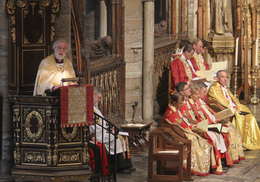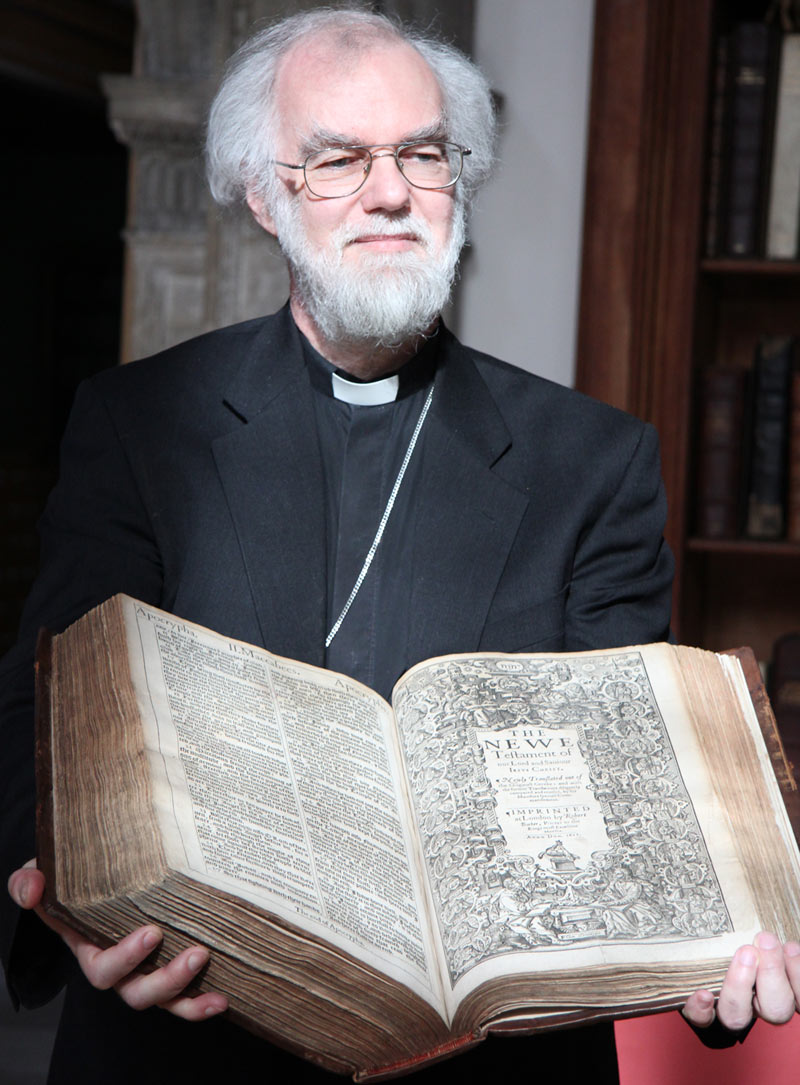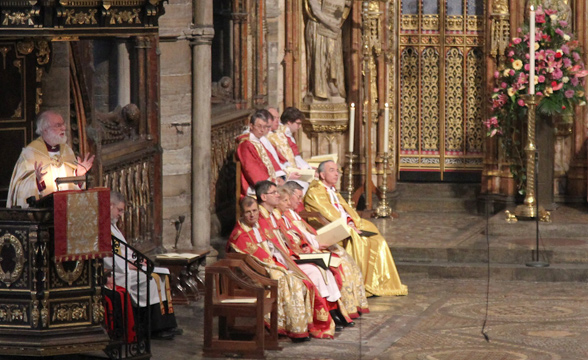Archbishop's sermon at Westminster Abbey - 400th anniversary of the King James Bible
 Archbishop Rowan preaching at Westminster Abbey
Archbishop Rowan preaching at Westminster AbbeyWednesday 16th November 2011
Archbishop Rowan Williams preached today at a Thanksgiving Service for the 400th anniversary of the 1611 Authorized (King James) translation of the Bible, attended by Her Majesty The Queen and TRH The Duke of Edinburgh and The Prince of Wales.In his sermon, the Archbishop reflected on the King James Version and on what makes a good translation: “A good translation will be an invitation to read again, and to probe, and reflect, and imagine with the text. Rather than letting me say, ‘Now I understand’, it prompts the response, ‘Now the work begins.’”
Regarding the historical context of the publication of the 1611 Bible, he said “it was not yet a volume that everyone could be expected to own…it was meant to be read aloud. And that means that it was meant to be part of an event, a shared experience. Gathered as a Christian community, the parish would listen, in the context of praise, reflection and instruction, to Scripture being read”.
Dr Williams concluded his sermon by saying that to celebrate the Bible “is to recognise the absolute seriousness with which [the translators] sought to find in our language words that would pass on to us hearers and readers in the English tongue the almost unbearable weight of divine intelligence and love pressing down on those who first encountered it and tried to embody it in writing”.
The service was the culmination of a year’s worth of events to mark the anniversary of this globally important text organized principally by the King James Bible Trust. This global importance has been reflected around the world over the past year. In the United States and in many Commonwealth countries there have been major symposia and conferences, with outstanding exhibitions featuring original 1611 Bibles. Church communities everywhere have celebrated the 1611 Bible with reading marathons, artistic displays, lectures, and commemorative services.
For its own part the Trust has both tried to give as much publicity as possible to all this effort through its website, and itself instigated a press and publicity campaign. It has helped promote major lectures at Hampton Court Palace and Windsor Castle. It has established education programmes for primary and secondary pupils in the United Kingdom, and has joined forces with the British Council to ensure that the literary and linguistic importance of the King James Bible continues to be spread throughout the world via the internet.
An artistic legacy is being left with the anthem performed at the Abbey today Out of the South Cometh the Whirlwind by Zachary Wadsworth; with the Bush Theatre’s Sixty-Six Books: 66 responses to the books of the 1611 translation by internationally renowned writers; and by the production of James, the Musical by Chester’s Theatre in the Quarter. The Trust’s most important work has however been to help people everywhere become reacquainted with this unique work of learning and language.
Further details of the service can be found on the Westminster Abbey website.
The full text of the Archbishop's sermon follows:
 Sermon given by The Archbishop of Canterbury
Sermon given by The Archbishop of Canterbury
at the Thanksgiving Service to mark the Four Hundredth Anniversary of the 1611 Authorized (King James) Version of the Bible
in Westminster Abbey, 16 November 2011
What is a good translation? Not one that just allows me to say, when I pick it up, 'Now I understand'. Of course, if I'm faced with a text in a strange language, I need to be able simply to read it; but a good translation will be an invitation to read again, and to probe, and reflect, and imagine with the text. Rather than letting me say, 'Now I understand', it prompts the response, 'Now the work begins.'
One of the most striking things in the wonderful Preface to the King James Bible composed by Miles Smith is the clear conviction that there is never an ideal or a final translation. To translate any work of significance is to reveal a certain range of meanings in the original; but there will always be, as the 1611 translators fully recognized, another range that hasn't yet been captured and will need another round of engagement with the text. If this is true of any important text, how much more true is it of Scripture, where the meanings are the self-communications of an infinite mind and love? The invitation that Scripture offers is an invitation to a pilgrimage further and further into the mysteries of that mind and love; and a good translation of the Bible must therefore be one that opens out on wider and wider horizons.
We have all suffered from a mindset in the last couple of centuries that has assumed there is an end to translating and understanding and thus that there is something wrong with any version of a text that fails to settle disputes and to provide an account of the truth that no-one could disagree with. But what the 1611 translators grasped was that hearing the Word of God was a lifelong calling that had to be undertaken in the company of other readers and was never something that left us where we started. Of course they believed, and said so robustly in that same Preface, that the essential lines of Christian belief were clearly laid out – belief in God the Creator, God who makes covenant with his people, God who becomes flesh and creates a new and universal community of believers by the death and rising again of the Word made flesh and the gift of the Holy Spirit, God who justifies us in freedom, not as a reward for good works. But this is not so much the revelation of a series of self-contained truths as an inundation of vision, a flooding of human language that can be strange and extreme and bewildering; it is a vision whose presence makes the sacred writers stumble and search for words at least as much as it makes them fluent and persuasive. Doesn't St Paul say just that in I Corinthians 2? 'My speech and my preaching was not with enticing words of man's wisdom, but in demonstration of the Spirit and of power.' That 'demonstration' may be most powerful when it is most inarticulate by normal standards, and Paul himself illustrates this again and again. 'What shall we say then to these things?' he asks, as he lets himself be swept along lyrically by the joyful mysteries of Romans 8; and 'O the depth of the riches both of the wisdom and knowledge of God!' he exclaims as he lays out the sorrowful mysteries of Romans 11, his agonised meditation on choice and rejection in the history of Israel and humanity and each human soul. His tortuous path towards the celebration of grace is no easy argument but a wrestling with the shattering implications of the events of Jesus' life and death. And a good translation is one that leads us through Paul's wrestling in all its clumsiness and passion.
And think too of how the Old Testament prophets cope with this shattering of their world; of Ezekiel trying to evoke the vision of the chariot of the Almighty filling the sky, awkwardly qualifying everything he says with 'as it were', and 'the likeness of', or 'the appearance of'. 'Above the firmament that was over their heads was the likeness of a throne, as the appearance of a sapphire stone: and upon the likeness of the throne was the likeness as the appearance of a man above upon it...This was the appearance of the likeness of the glory of the LORD. And when I saw it, I fell upon my face, and I heard a voice of one that spake' (Ezek.1.26, 28b). What makes the translation a good translation is that there is no attempt to smooth over the stumbling of the original: it was if it were like the impression of something, as it were...This is the precision of revelation because it is language showing the weight it bears, the weight of a Word from outside ordinary categories. And the 1611 translators never let us down in this, never seek to make it easy. It is one of the things that gives this version its abiding importance. It remains an invitation to work, to open up our own language to this weight of presence and gift.
'In the beginning was the Word'. Before anything, God is a God whose life pours out in the intelligence of love, necessarily and always. Every created word, even the words we use to speak of this eternal truth, will be struggling breathlessly to keep up with the Word itself, himself. The English Reformation often made use of the phrase 'God's Word written' to describe Scripture. And we should not take this to mean a mechanical dictation; rather it says that when human language writes what God does and says in all his acts throughout history, the Bible is what it looks like. Wax bearing the imprint of what I called just now the weight of the Word. To read or rather to hear that Word in our reading and hearing of Scripture is not to thumb through a volume of records and commands but to absorb Scripture's language in such a way, at such a depth, that we sense that weight and accept the burden and the joy of labouring at a lifelong response to it.
I've mentioned hearing as well as reading. It's easy to forget that when the 1611 Bible was first published it was not yet a volume that everyone could be expected to own. Like its Reformed predecessors, Tyndale's Bible, the Geneva Bible, the Bishops' Bible—and unlike its Catholic parallel, the Rheims/Douai version—it was meant to be read aloud. And that means that it was meant to be part of an event, a shared experience. Gathered as a Christian community, the parish would listen, in the context of praise, reflection and instruction, to Scripture being read: it provided the picture of a whole renewed universe within which all the other activities made sense. It would not be immediately intelligible by any means, but it marked out the territory of God's work of grace. It affirmed, with St Paul in II Corinthians, that the landscape of the world was illuminated by the new and radical act of God in Jesus Christ, so that the standards of this world and society were shown to be under judgement; yet it also affirmed that this illumination was something it took time to get used to, time to find words for, and that the clay pots of custom and ritual were both necessary and problematic – and that this was simply how human beings heard and echoed the Word. 'How can man preach Thy eternal Word?' asked George Herbert a couple of decades after 1611; 'he is a brittle, crazy glass.' But, as that great poem of Herbert's goes on to claim, even in fragile material God's story can be sealed and printed, and the light come through.
So to celebrate the Bible of 1611 is not to genuflect before a timeless masterpiece, to salute a perfect translation; the translators would have been both baffled and embarrassed by any such idea. It is to recognize the absolute seriousness with which they sought to find in our language words that would pass on to us hearers and readers in the English tongue the almost unbearable weight of divine intelligence and love pressing down on those who first encountered it and tried to embody it in writing; those who like Moses and Ezekiel found themselves overwhelmed by the sheer 'density' of divine presence, those who like St Paul found themselves dizzy with the number of connections and interrelations between God's acts over the ages and unable to put it all into a theory, only into a hymn. The temptation is always there for the modern translator to look for strategies that make the text more accessible; and when that temptation comes, it doesn't hurt to turn for a moment—for some long moments indeed—to this extraordinary text, with its continuing capacity to surprise us into seriousness, to acquaint us again with the weight of glory – and, we hope and pray, to send us back to the unending work of letting ourselves be changed so that we can bear just a little more of the light of the new world, full of grace and truth.
Christopher Southgate wrote a poem for the meeting of the Society of Biblical Literature here in London last July which captures much of this, and I end with its opening words:
'To begin on the Bible
To be caught by the rise of a huge wave breaking
To know all the conflict and chaos to be faced
If their book could not command
The nation, the language, in a foment of becoming.
They heard Scripture's ancient voices, remote,
Tasting of the desert,
Its longing, in a strange land.
Their task they called
A paradise of trees of life. Long hard years
They walked in this forest.'
So we listen in turn; and we walk into that forest, among the trees of life.
© Rowan Williams 2011

From the Order of Service:
The creation of the 1611 Authorized (King James) Bible
The King James Bible began life at a conference convened by James I at Hampton Court Palace in 1604. There it was ordered that a new translation of the Bible be produced, as the King strove to forge unity between Scotland and England. It was the culmination of over two centuries of struggle to create a Bible in English, going back to John Wycliffe in the 1380s.
The gestation of the King James Bible itself began with William Tyndale. He was the first to translate the New Testament into English from the original Greek, but in 1536 he was burned at the stake in Flanders for his efforts. In 1538 Henry VIII ordered that a Bible be placed in every church in England and Myles Coverdale was commissioned to produce what became known as the Great Bible. This was largely based on Tyndale’s work.
Translation of the Bible remained controversial. In 1560 English Calvinist exiles in Geneva produced the Geneva Bible, beautifully produced but with tendentious translations and notes that James abominated. Partly in response, in 1568 the English Church commissioned the Bishops’ Bible. This was used every Sunday in Elizabethan churches but was ponderous and never popular. And English Catholics in exile produced a New Testament in Rheims in 1582 and an Old Testament in Douai in 1609–10.
The King James Bible was produced in the light of each of these versions. It was the work of fifty-four scholars working in six translation committees – or Companies – based in Oxford, Cambridge, and Westminster, two in each centre.
The crucial final editing took place here at Westminster Abbey, in the Jerusalem Chamber, where the translators read their new version of the Bible aloud from start to finish. They ended up using a relatively limited vocabulary compared – for example – to their contemporary Shakespeare, but they coined many phrases we still use today: ‘the powers that be’; ‘the apple of his eye’; ‘signs of the times’, ‘a law unto themselves’, ‘from strength to strength’, ‘the writing on the wall’. It is therefore fitting that this service, the culmination of a year of celebration, should take place in Westminster Abbey, whence the King James Bible was first sent out into the world.
'The scholars who produced this masterpiece are mostly unknown and unremembered. But they forged an enduring link, literary and religious, between the English-speaking people of the world.'
(from Winston Churchill, The New World, 1956)
